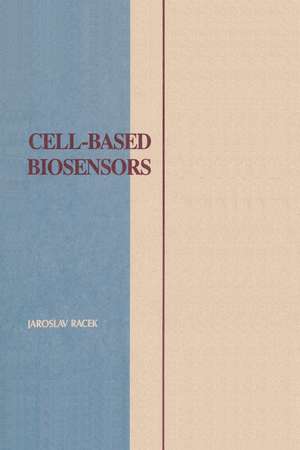Cell-Based Biosensors
Autor Jaroslav Raceken Limba Engleză Hardback – 9 dec 1995
Isolation, purification, and immobilization of enzymes are often very difficult; these can be omitted with cell-based biosensors.
Some enzymes can lose their activity during isolation or immobilization; this risk is eliminated by the use of whole cells.
Enzymes in the cell's natural environment are usually extremely stable.
Multi-step enzyme reactions in intact cells can be used, making it possible to avoid the preparation of complicated artificial multi-enzyme systems.
Coenzymes and activators are often present in the cells, and thus, it is not necessary to add them into the system; the cell itself usually cares for their effective regeneration.
Preț: 509.20 lei
Preț vechi: 685.63 lei
-26% Nou
Puncte Express: 764
Preț estimativ în valută:
97.45€ • 100.67$ • 81.10£
97.45€ • 100.67$ • 81.10£
Comandă specială
Livrare economică 04-18 martie
Doresc să fiu notificat când acest titlu va fi disponibil:
Se trimite...
Preluare comenzi: 021 569.72.76
Specificații
ISBN-13: 9781566761901
ISBN-10: 1566761905
Pagini: 107
Dimensiuni: 210 x 280 x 8 mm
Greutate: 0.21 kg
Ediția:1
Editura: CRC Press
Colecția CRC Press
ISBN-10: 1566761905
Pagini: 107
Dimensiuni: 210 x 280 x 8 mm
Greutate: 0.21 kg
Ediția:1
Editura: CRC Press
Colecția CRC Press
Public țintă
ProfessionalCuprins
Introduction - Cell-Based Biosensors - Construction and Peculiarities of Basic Types of Cell-Based Biosensors - Properties of Cell-Based Biosensors - Causes of Cell-Based Biosensor Unselectivity - Methods of Selectivity Improvement of Cell-Based Biosensors - Practical Use of Cell-Based Biosensors - Conclusion and Future Prospects - Appendix - References
Descriere
SOME ADVANTAGES OF CELL-BASED BIOSENSORS:
Isolation, purification, and immobilization of enzymes are often very difficult; these can be omitted with cell-based biosensors
Isolation, purification, and immobilization of enzymes are often very difficult; these can be omitted with cell-based biosensors
